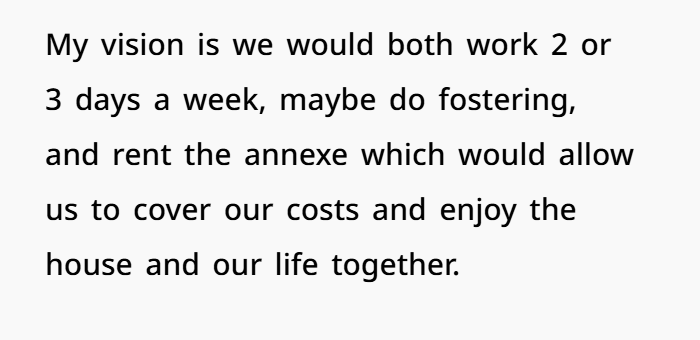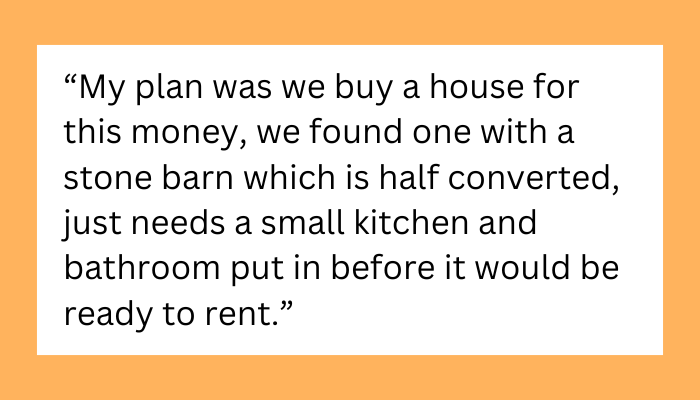Man Wants GF To Support Him So He Can Work Less For His “Mental Health” She Says It’s Totally Unfair
OP (M34) inherited a life-changing £450k from his grandfather and plans to use it to buy a dream home with his long-term girlfriend (F29). The house includes a nearly-finished annexe that could be rented out once completed. While he’s covering the full cost of the home and its upgrades, he hopes that within a few years—once things are settled and his girlfriend is more financially stable—she’ll contribute £600/month toward shared living expenses, which total around £1,200/month.
He’s also offering her any future rental income from the annexe to offset her costs, meaning if it earns £600/month, her share would effectively be covered. He doesn’t expect her to pay for the house, maintenance, or renovations. He simply wants to share household costs as partners. However, his girlfriend feels this is unfair, particularly since she earns minimum wage and he earns significantly more—even if most of his salary is spent on therapy due to his stressful role as a specialist therapist.
Now, OP is wondering—is it unreasonable to expect his girlfriend to split expenses on a house she doesn’t legally own, even if he’s covering all the big stuff?
This man’s grandfather had left him a life-changing amount of money, so he bought a house with it

However, he and his girlfriend can’t seem to agree on who pays what















Let’s be real—money in relationships is never just about pounds and pence. It’s about fairness, security, and power dynamics. And in your case? It’s even trickier. You’re navigating a huge financial imbalance in a thoughtful way. You’ve inherited a home, and your girlfriend comes from much less. So the real question here isn’t just “should she pay £600/month?” It’s: what’s fair when one person owns everything and the other owns nothing?
🏡 1. You’re Not Charging Her Rent—That Matters
Let’s be clear about what you’re asking. You’re not charging her rent for living in “your” house. You’re asking her to contribute to shared living expenses: food, electricity, water, council tax, pet care, etc.

This is key because people often conflate “rent” with “shared bills.” Rent implies profit—you’re making money off her living there. But if you’re both paying £600 each and it all goes to keeping the lights on and food in the fridge, then that’s just cohabiting like equals.
Plenty of couples do this. According to UK relationship charity Relate, financial fairness doesn’t always mean “equal contribution” but rather “equitable contribution”—based on income, ability, and shared goals. And you’re actively offering flexibility and long-term benefit.
💼 2. Her Lower Income? A Fair Point—but Not a Dealbreaker
Your girlfriend earns minimum wage. You earn more per hour, but most of it goes to therapy, which you need for both personal treatment and professional training. That puts both of you in tight spots financially.
But here’s what matters: you’re not demanding £600 from her now. You’ve made it clear that you’ll keep covering 100% of everything until she’s ready—emotionally, mentally, and financially. That’s huge. Many people wouldn’t be so patient or generous.
And let’s not forget—you’re also offering her a financial cushion by assigning her the first £600/month of rental income from the annexe. That means she may never even have to physically hand over cash if that space is rented out. It’s essentially a cost-neutral living arrangement.
👩⚖️ 3. Legal Protection: The Elephant in the Room
Here’s where things get sticky.
You own the house. She doesn’t. You’re offering her a safe place to live and future cost-sharing, but what legal protections does she have?
If you split up, she has no claim on the house. That’s fair, because it’s your inheritance, and you’ve been transparent. But without a cohabitation agreement or written contract, she’s left vulnerable—even if she contributes for years.
If you’re serious about fairness, consider formalizing something like:
- A tenancy in common agreement (if you ever decide to add her name later)
- A cohabitation agreement outlining financial responsibilities
- A savings plan or investment in her name so she can build independent financial security
This is about trust, yes—but also about clarity. Because “I promise” isn’t enforceable in court.
❤️ 4. Power Dynamics Are Real in Unequal Relationships
One reason your girlfriend may feel anxious or even resentful isn’t just money—it’s the emotional power imbalance.

You inherited the home.
You control what gets done to it.
You control whether she stays.
You’re choosing how the annexe is used.
You decide how much she pays, and when.
Even if you’re incredibly fair (and you sound like it), that’s a lot of control in one person’s hands. Some people feel like “tenants” or “guests” instead of equal partners in this setup.
The only way to ease this tension is transparency, mutual agreements, and flexibility. Keep involving her in decisions. Make joint goals. Check in emotionally—not just financially.
👁️ 5. Are You Being Controlling About Work-Life Balance?
You mentioned wanting a slower lifestyle—less work, more time enjoying the land, possibly fostering. That’s beautiful. But your girlfriend might feel boxed in if she can’t afford that life on her income.
You said:
“I really don’t want her working full time or shift work because it would spoil the lifestyle for me.”
Let’s unpack that. You’re not trying to control her. You just want to build a peaceful life. But if she’s the one being asked to live on minimum wage while paying bills on a property she doesn’t own, and also being told what kind of job she should or shouldn’t take… that can come off as controlling, even if that’s not your intention.
If you want her to work less, consider supporting that wish financially—without expecting £600/month from a minimum-wage salary. Maybe adjust contributions to a percentage of income instead of a flat amount.
People who read his story believe the man needs to reevaluate his plans for the future








You’re not the AH for asking your girlfriend to contribute to living expenses in a home where you’re both building a life. You’re being thoughtful, transparent, and generous in many ways.
But her concerns are valid, too:
- She has no legal protection.
- She earns much less than you.
- She’s being asked to financially support a life she doesn’t fully control.
Your intentions are solid, but this needs to be approached gently, with legal support and ongoing emotional check-ins. Money doesn’t have to break relationships—but lack of clarity almost always does.

